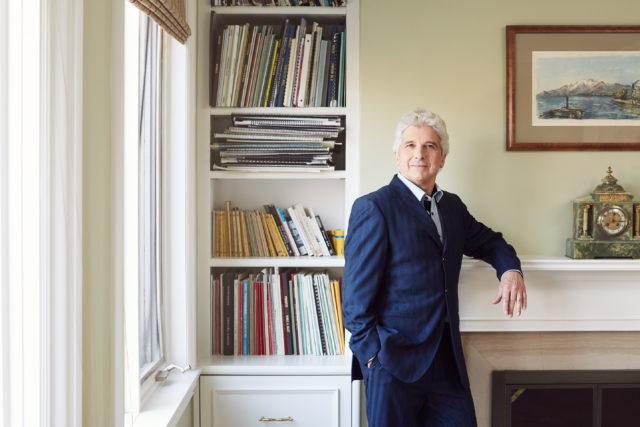
Peter Oundjian is the most distinguished musician to lead the Colorado Music Festival (CMF) in its 43 seasons.
Since Jean-Marie Zeitouni stepped down as music director at the end of last season, Oundjian — former first violinist of the Tokyo String Quartet and just-retired as music director of the Toronto Symphony and Royal Scottish National Orchestra — has been artistic advisor to the festival. This year he will conduct three weeks of orchestral concerts, starting the weekend of July 12–15.
Zeitouni, now CMF’s principal guest conductor, will lead the orchestral concerts the following week. Oundjian will return for the final two weeks, July 26–Aug. 4.
For his concerts, Oundjian has established a theme: “It’s all Bernstein-inspired,” he says, in honor of the 2018 centennial of Leonard Bernstein’s birth. That means “things that influenced Bernstein, things Bernstein loved, things he was famous for, and by extension, music written on American soil.”
For the July 12 Festival Orchestra concert, Oundjian says, “We start with Candide, which is probably Bernstein’s most famous overture, and then the Symphonic Dances of Rachmaninoff, one of my favorite pieces, written on America soil in the last years of the composer’s life.”
To follow Oundjian’s theme, the music for the July 15 Chamber Orchestra concert was all written in America: Aaron Copland’s Appalachian Spring, Samuel Barber’s Adagio for Strings, and Philip Glass’s Concerto No. 2 for Violin, “American Seasons,” to be performed by violinist Robert McDuffie, for whom it was written.
The odd piece out would be the Brahms Piano Concerto No. 1 on the July 12 program, performed by famed Russian pianist Yefim Bronfman. This will be the only CMF concert this year to be repeated in full on Friday, July 13.
Of course Brahms did not write any music in America, but Oundjian explains the connection: when Bernstein conducted a performance of the concerto with the famously eccentric pianist Glen Gould in 1962, he gave a controversial speech saying that he didn’t like Gould’s interpretation, but he firmly supported Gould’s right to play it as he saw fit.
“It’s a brilliant speech,” Oundjian says. “Controversy was one of Bernstein’s passions.”
Apart from the speech, Bronfman appreciates Bernstein and Gould’s performance. “This is one of the great performances of this concerto,” he says. “The fact that they disagreed was a positive, not a negative. If you agree, sometimes it can be boring.”
To Bronfman, Brahms’s First Piano Concerto constitutes a serious challenge. “It’s terrifying, because it’s overwhelming — the music is larger than life,” he says. “For me, the heart of the piece is the second movement, one of the most beautiful things Brahms has ever written. This is almost a religious experience.”
McDuffie and Oundjian gave the premiere of Glass’s “American Seasons” Concerto in 2009. Conceived in response to Vivaldi’s popular “Four Seasons” concertos, it remains one of McDuffie’s favorite pieces. “I must have played it close to 100 times, and I still love every note,” he says. “I feel privileged to play it.”
There is one mystery about the piece: which movement represents which season. When he received the music, McDuffie formed a definite idea about the movements, but it was not what Glass intended. “We didn’t agree on any season,” he says. “He was cheerful about it [and] said, ‘Well, let the audience decide.’”
Still, when he performs it, McDuffie recalls his original impression. “My [sequence] is fall-winter-spring-summer, and his are spring-summer-fall-winter,” he says. “But in my defense, more people agree with me.”
For his two orchestral concerts, Zeitouni has selected the same kind of programming that distinguished his years as music director: great vocal works and Romantic gems, with a bit of French flavoring added. The Festival Orchestra concert July 19 will feature mezzo-soprano Michelle DeYoung in one of the most brilliant soprano scenes of all times, the Liebestod (Love-death) from Wagner’s Tristan und Isolde, performed with the orchestral prelude.
On the same program, DeYoung and the orchestra will present the world premiere of Buch des Sängers (Singer’s book) by Austrian composer Timothy Collins. The concert will conclude with the virtuoso orchestra showpiece Scheherazade by Rimsky-Korsakov, certainly one of the most popular and most familiar works in the repertoire.
This year’s SeiSolo Artist-in-Residence at CMF, DeYoung will remain in Boulder for the following week for educational activities, a solo recital and another appearance with orchestra singing the Abschied movement of Mahler’s Lied von der Erde (Song of the Earth).
The first Fresh Friday of the summer will be July 20, with Scheherazade paired with Borodin’s colorful In the Steppes of Central Asia. These informal concerts begin at 6:30 p.m. and last only an hour, without intermission.
Zeitouni’s chamber orchestra concert July 22 offers Ravel’s Ma mère l’Oye (“Mother Goose”) followed by Beethoven’s Third Symphony, the “Eroica,” which is often called the first truly Romantic symphony.
On the Bill: Colorado Music Festival. Week of July 12–22.
For full schedule, go to coloradomusicfestival.org
All performances at Chautauqua Auditorium, Boulder, 303.440.7666
For tickets, go to coloradomusicfestival.org/tickets














